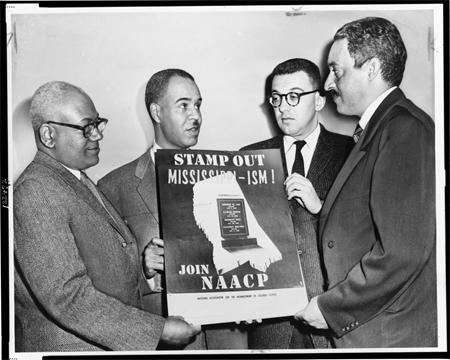Primary Source Spotlight: NAACP
Curated set of primary sources and other resources related to the National Association for the Advancement of Colored People (NAACP)
The NAACP: A Century in the Fight for Freedom primary source set, includes teacher’s guide
Historical newspaper coverage
- National Negro Committee 1910
- National Association for the Advancement of Colored People articles from the Broad Ax 1895-1922
- National Association for the Advancement of Colored People
- NAACP
Oral histories
- NAACP secretary Cecilia Suyat Marshall 2013 video interview
- Reverend Dr. Amos Brown discusses his childhood in Jackson, Mississippi and meeting mentor Medgar Evers 2013 video interview
- Oliver W. Hill, Jr., discusses his father, civil rights lawyer Oliver Hill part of the NAACP Legal Defense Fund 2013 video interview
- Joseph Lowery remembers joining the National Association for the Advancement of Colored People (NAACP) and helping to found the Southern Christian Leadership Conference (SCLC) 2011 video interview
- Robert Hayling recalls leading the local National Association for the Advancement of Colored People (NAACP) youth group and also discusses resigning from the NAACP 2011 video interview
- Thomas Gaither recalls attending Claflin College and leading the college’s NAACP chapter 2011 video interview
- Calvin Luper remembers his mother, Clara Luper, and her leadership in Oklahoma City’s NAACP Youth Council 2011 video interview
Legislation related to the NAACP
Streaming webcasts
- Black History Month 2010: NAACP 100th Anniversary 2010/02/03
- The NAACP: Reflections on the First 100 Years 2010/02/26
- White: The Biography of Walter White, Mr. NAACP 2003/02/25
- “We Must Learn to Think in Terms of Collective Action” – the influence of labor activism on the civil rights agendas of the NAACP and National Urban League 2011/08/02
NAACP Centennial: A Century in the Fight for Freedom Library of Congress Information Bulletin March 2010
NAACP: A Century in the Fight for Freedom online exhibition
NAACP items from the African American Odyssey online exhibition
The Civil Rights Act of 1964: A Long Struggle for Freedom, online exhibition items related to the NAACP
- Background on efforts of NAACP 1900-1939
- Background on efforts of NAACP 1950-1963
- NAACP founder William E. B. Du Bois
- NAACP founder William Lloyd Garrison
- NAACP founder Mary White Ovington
- NAACP founder William English Walling
- NAACP leader Roy Wilkins
- NAACP Chief Strategist Charles Hamilton Houston
- NAACP Special Counsel Thurgood Marshall
- NAACP Lawyer Arthur Spingarn
- NAACP Program Director James Farmer
- NAACP Board Member Joseph L. Rauh
- NAACP organizer Harry Tyson Moore
- NAACP Field Secretary Medgar W. Evers
- NAACP Labor Secretary & Chief Lobbyist Clarence Mitchell
- NAACP Labor Secretary Herbert Hill
- NAACP Field Secretary Ella Baker
- Ida B. Wells-Barnett
- Mary Church Terrell
- Walter Francis White
- Niagara Movement, 1905
- Platform adopted by the National Negro Committee. Printed document, 1909
- Albert Pillsbury to NAACP Secretary Mary White Ovington, July 26, 1910 regarding Pink Franklin case
- Guinn v. United States. Board minutes, June 3, 1913
- NAACP Letter to President Woodrow Wilson on Federal Race Discrimination, August 15, 1913
- NAACP Silent protest parade in New York City against the East St. Louis riots, 1917
- Buchanan v. Warley, 1917
- Federal Law Against Lynchings, Speech of Hon. L. C. Dyer of Missouri in the House of Representatives, May 7, 1918
- Flag flown at NAACP headquarters, ca. 1920
- Report of the Detroit Branch of the NAACP, September 1921
- Nixon v. Herndon (1927) and Nixon v. Condon (1932)
- Margold Report, 1931
- Eleanor Roosevelt to NAACP Secretary Walter White, March 19, 1936
- Charles H. Houston to Walter White, May 24, 1938 regarding Missouri ex. rel. Gaines v. Canada
- A. Philip Randolph to NAACP Secretary Walter White, March 18, 1941 regarding mass march on Washington
- Thurgood Marshall’s “Saving the Race” Memorandum to the NAACP legal staff, November 17, 1941
- Purpose of the NAACP Washington Bureau, 1942 memorandum
- NAACP Secretary Walter White soliciting funds to support the litigation of Morgan v. Virginia, May 20, 1946
- George L. Vaughn to Thurgood Marshall concerning Shelley v. Kraemer, January 13, 1947
- NAACP Acting Secretary Roy Wilkins to Officers of Branches, State Conferences, Youth Councils and College Chapters, October 21, 1949
- NAACP Report on the Emmett Till Murder, 1955
- NAACP Baltimore Branch flyer advertising a lecture by Rosa Parks, September 23, 1956
- Theodore W. Kheel to NAACP Executive Secretary Roy Wilkins, September 25, 1957
- Daisy Bates to NAACP Executive Secretary Roy Wilkins, December 17, 1957
- The Day They Changed Their Minds. New York: NAACP, March, 1960 pamphlet
- Report on President’s Committee on Equal Employment Opportunity (Rough Draft), 1961
- Transcript of telephone conversation between NAACP’s Georgia Field Secretary Vernon Jordan, and Director of Branches Gloster B. Current, December 14, 1961
- John A. Morsell, assistant to NAACP executive secretary, to President John F. Kennedy requesting the assistance of the federal government, September 21, 1962
- Roy Wilkins to Branches, Youth Councils and State Conferences (Action Memo, No. 2—Civil Rights Bills), July 25, 1963
- Clarence Mitchell to the Honorable Emanuel Celler, Chairman, U.S. House of Representatives Judiciary Committee, October 18, 1963
- Roy Wilkins to The Honorable Emanuel Celler, Chairman, Judiciary Committee U.S. House of Representatives, February 21, 1964
- Clarence Mitchell. Monthly Report of the Washington Bureau, March 5, 1964
- Clarence Mitchell to Roy Wilkins(Senate letter 1), March 12, 1964
- Clarence Mitchell to Roy Wilkins (Senate letter 3), March 27, 1964
- Clarence Mitchell to Roy Wilkins (Senate letter 4), April 3, 1964
- Clarence Mitchell to Roy Wilkins (Senate Letter 5), April 10, 1964
- NAACP Washington Bureau: Dirksen Amendments to Title VII, April 22, 1964
- Clarence Mitchell to Roy Wilkins (Senate Letter 7), April 24, 1964
- Clarence Mitchell to Roy Wilkins (Senate Letter 9), May 8, 1964
- Roy Wilkins to Senator Barry Goldwater, May 13, 1964 telegram
- Clarence Mitchell to Roy Wilkins (Senate Letter 11), May 25, 1964
- Clarence Mitchell to Roy, June 2, 1964
- Clarence Mitchell to Roy Wilkins (Senate Letter 15), June 20, 1964
- NAACP lawyer Jack Greenberg discusses the NAACP’s strategy after the passage of the Civil Rights Act 2011 video interview
- Civil rights activist Joyce Ladner discusses post-war Southern black youth in the movement 2011 video interview
- Civil rights activist Marilyn Luper discusses her mother Clara’s leadership in the NAACP Youth Group in Oklahoma City 2011 video interview
- NAACP secretary Mildred Bond Roxborough discusses the achievements of the organization 2010 video interview
- NAACP lawyer and minister Benjamin Hooks explains the landmark 1954 Brown v. Board of Education case 2003 video interview
- NAACP lawyer Constance Baker Motley discusses her surprise at crowds at the March on Washington and how it led to the passing of the Civil Rights Act 2002 video interview
2003 interview with NAACP Chairman Julian Bond for WQED’s Black Horizons American Archive of Public Broadcasting
Related Library blog posts
- The Legacy of Medgar Evers Through the NAACP Records Unfolding History: Manuscripts
- The NAACP: Using Posters to Encourage Civic Action Teaching with the Library
-
Using Chronicling America to Explore the Work of the NAACP Teaching with the Library
- Visualizing Injustice: Early NAACP Cartographers and Racial Inequality in America Worlds Revealed: Geography & Maps
- NAACP website
The Niagara Movement and the NAACP lesson plan
Related PSN resources
- Today in History: James Weldon Johnson
- Today in History: Thurgood Marshall
- Today in History: Mary Church Terrell
- Primary Source Spotlight: W.E.B. Du Bois
- Primary Source Spotlight: A. Philip Randolph
- Primary Source Spotlight: Civil Rights
- Primary Source Spotlight: Lynching
- Primary Source Spotlight: Black American History & Heritage

